Nickolai and the Ifrit
I’ve got a bunch of illustrated children’s books that I’ve written. The problem is, they’re not illustrated; they’re unillustrated illustrated books. Sounds like a shitty zen koan, right? A partially realized dream, a half of a whole, but ultimately, a whole lotta nothing. A cloud of unrealized potential.
Last year, I tried to go all in on making one of them real. In what seemed like a magical circumstance of right-time-right-place-ism, at an odd event I got roped into attending, I was seated next a talented artist who was going through some rough emotional patch and we bonded over a mutual love of various artists and genre works. I told him about a story I had written, about a kind hearted boy who finds a powerful but damaged wish-granting spirit, an Ifrit, and how the two manage to break the terrible cycle of power and ruin that wish-asking-and-granting always seems to lead to. I figured, “Maybe we can grant one another’s wishes. Let’s shock the world.”
I took out more money than I had and I told him I’d pay him an initial retainer and a LARGE hourly rate and that we’d be 50/50 partners, should this ever find publication success, since there’s no such thing as an illustrated book without an illustrator; it’s only fair for the artist to get at least half.
Part of his tale of woe was how he had lost all of his Wizards of the Coast Magic The Gathering Cards in his divorce; his ex had left him and taken them all and sold them. I had a cache of my father’s old Magic cards; we had collected them when they first came out. First edition, all I knew I could sell them for probably around $3000 to someone who would turn around and sell them for more, but these were my dad’s… Just getting some lump sum seemed profane. Since the story was about a simple boy of modest means who didn’t need riches or power because he had been raised by a strong & loving father, it made more sense to give the cards to this artist, as a show of faith in his ability, and to “grant his wish,” in and of a sort. This was not a down payment, it was a gift, freely given. Magic.
Well. Be careful when trying to live your life like a story, is what I can tell you. I still try to, pretty much all the time, because this is the foolish way my heart seems to be constructed, but it doesn’t always work out.
The artist took the cards then went radio silent. After a few days, he sent me a long, long, loooong text about how doing art right now was not where his soul was, and that he would not be doing this, or any other art for the time being and that he wished me luck on the project.
I told him I am not the type to give a gift then ask for it back, but under the circumstances, it’d probably be proper. He informed me, tearfully, that he had sold them in order to pay his rent and some bills and he understood how terrible that was, but he hoped I’d understand.
So.
So here we are. It’s 2023, and I’m 50 years old. (I look young, though!) But I’m facing the very real idea of never seeing any of these things I dream up in my head ever finding their way to the shelves and minds of strangers.
I’m not very good with money and don’t care too much about it. I know we need it, but it’s just a bunch of coupons to exchange for stuff. Stuff is good and some stuff is necessary. I can’t seem to summon up the drive to care about the coupons, though.
I care about stories and it’d be wonderful to live in a world where telling them to people could bring me money, to allow me to tell more, but we don’t live in a world where Ifrits get trapped in bottles and wishes get granted. That’s why we must write about such things. I think.
It’s the TELLING that’s important. I have this dusty old blog that I haven’t touched in quite some time. I’m using to to grant my own wish. The wish was always, “I hope people will read the story and hear it and it will make them feel like I felt, when I told it to myself.”
I’ll tell the story here, for you. Whoever you are, where ever you are, if you’re amenable to reading it.
There is magic all around us and sometimes wishes get granted in odd ways. I’m sitting in my living room, clickity-clacking my fingers onto a row of keys and with a few button presses and some formatting, there you are, where ever that is, and those words are in your hand or on your screen and in your mind.
Here’s Nickolai and the Ifrit. It’s a story I’m very proud of and I hope you’ll read it and I hope you’ll like it. The text of the story is in bold; the rest are suggestions of the scene, for an artist to use as a jumping off point. Read either or both; it’s up to you. I’ve put the couple-of-few rough concept sketches that the artist managed to do, and maybe they’ll help you see the ideas of the pictures the words might have conjured up. Here’s me, reading the story, if that’s easier. Either way. Or both!
Nickolai and the Ifrit
For Nickolai, who invited Jacinda to his birthday party, and who seemed like a sweet boy.
Page 1:
[Illustration suggestions: Maybe a bucolic, inviting background of greens and lazy vine-plants, and NICKOLAI, a small boy of 6 or 7. He has large eyes and is thin. He wears a representational cream colored vest and pants and boots of earth-tone colors, such that the time period is not certain or pinned down. Or maybe, depending on the overall design of the illustration style, just the boy on a field of white page, with a circle around him with the green background.]
Once there was a boy named Nickolai, and he was happy, because he was loved.
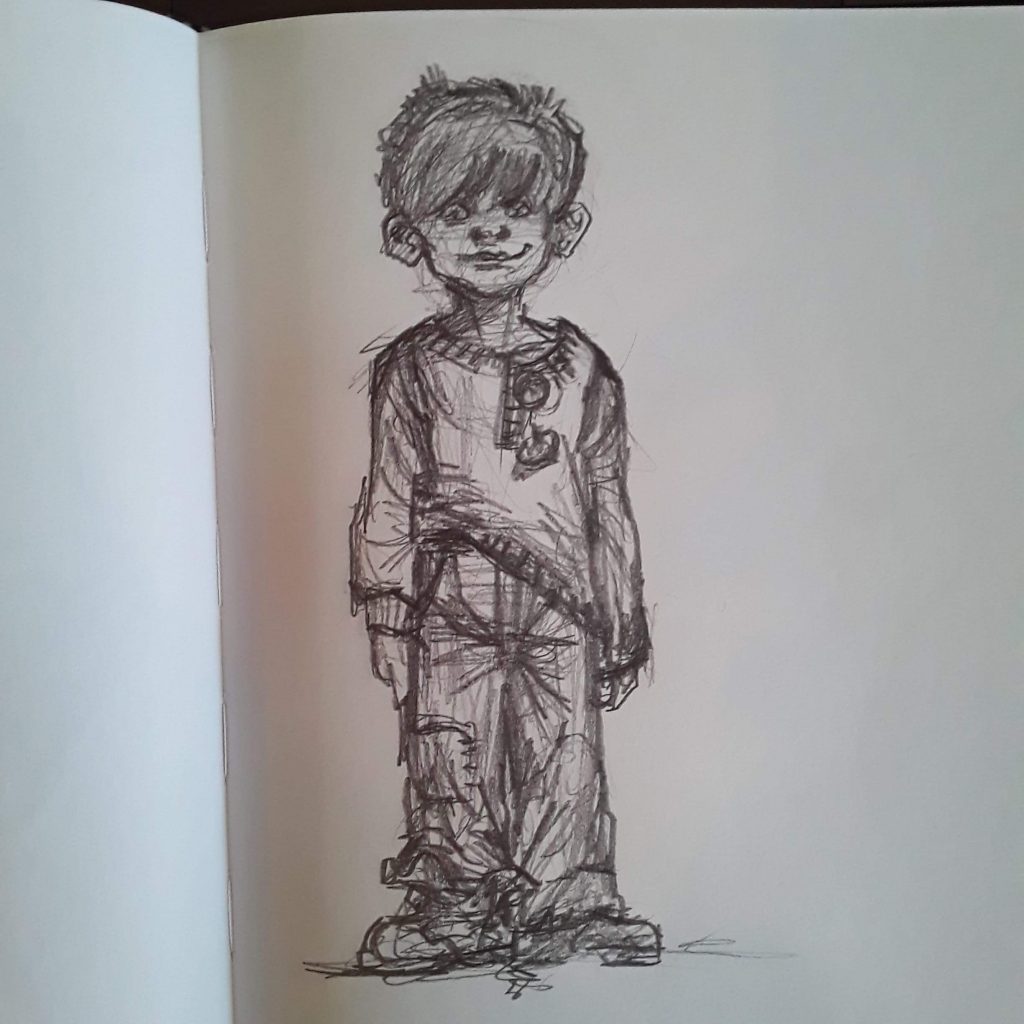
Pages 2 and 3:
[Illustration suggestions: Page 2, a homey cottage is nestled in an inviting woodland setting. A man, NICKOLAI’S FATHER, can be seen gathering wood and smiling, looking to the boy, who is sitting cross legged in front of the house at once paying attention to his father while whittling a stick with a small pocket knife. A pleasant and attractive woman, NICKOLAI’S MOTHER can be seen in one of the cottage’s small open windows. Page 3 shows a humble but cheery cottage bedroom, where NICKOLAI’S MOTHER sits at bedside, while NICKOLAI is bundled and warm, trying to get to sleep.}
He lived in a cottage in the woods, and while his family was not wealthy, he did not want for much. He was never without breakfast or supper. His father was strong and good and told him funny stories and showed him how to carve animals out of wood. His mother sang songs to him at night and held him close when he was scared.
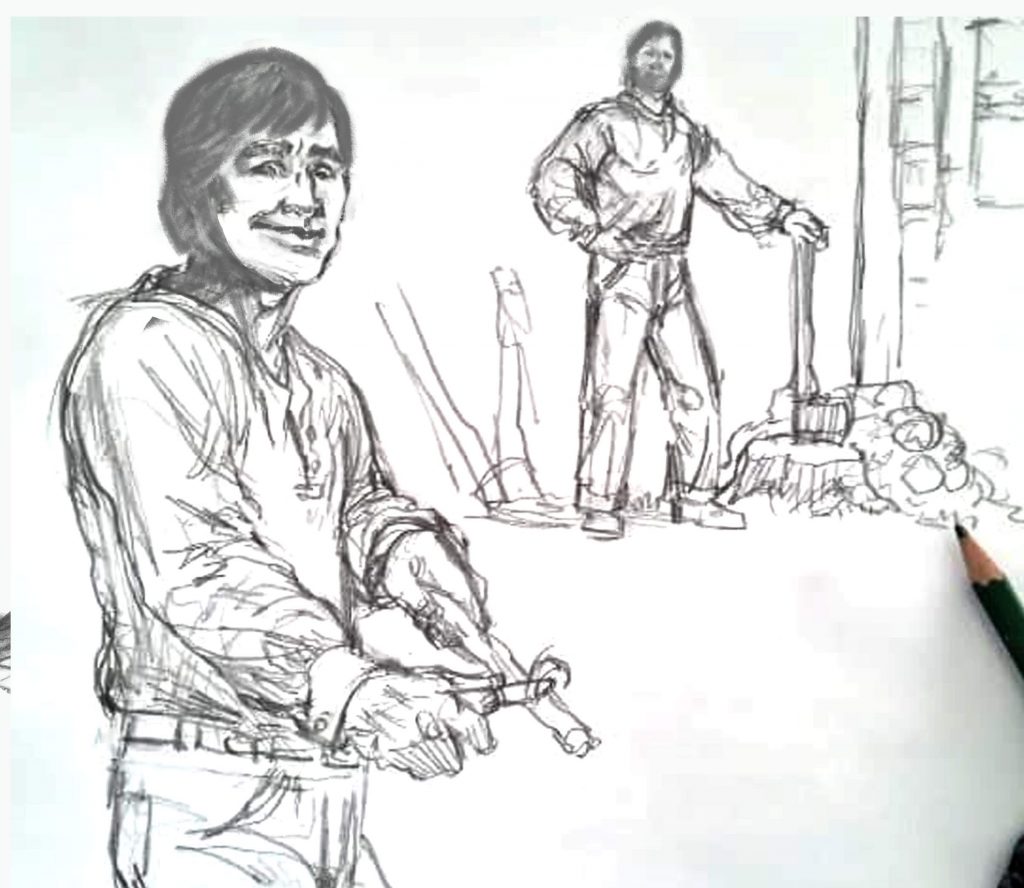
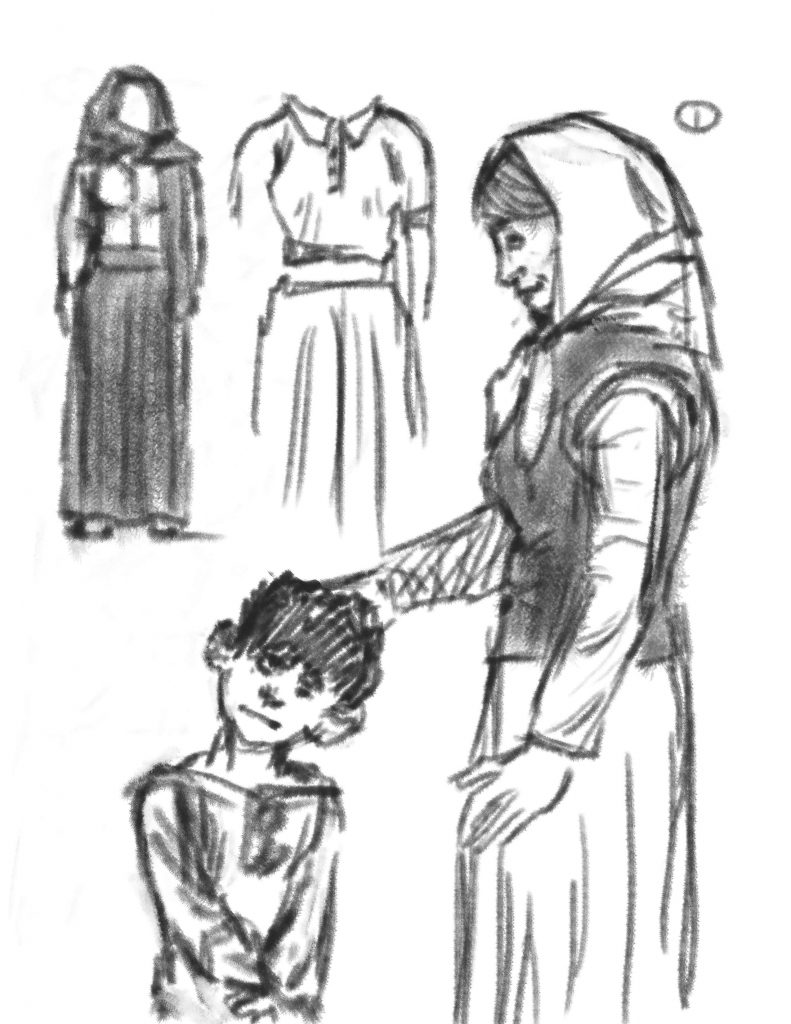
Pages 4 and 5:
[Illustration suggestions: Page 4, a montage of NICKOLAI at play in various areas, up a tree, peering into his cupped hands as he gingerly holds a live tree frog, assiduously placing a rock onto a small makeshift rock wall, with maybe little toy soldiers about it, another might show his head and hands coming out from a bush that is lit upon at many branches by colorful butterflies. Page 5 might be the family at dinner, with the hearth in the background, and a hearty crock of stew before them, being served by the Father. Or maybe just NICKOLAI, seen from behind, approaching the open cottage door at near-nightfall, with bright lights from the window, and lively smoke coming from the chimney?}
Nickolai spent many afternoons wandering alone in the forest near his cottage, where he would play by himself. He would climb trees or catch toads in his hands, or make little rock walls or draw pictures in the dirt with a stick, or count how many different butterflies he could see. He would play all day and come home by sunset, where his supper would be hot and waiting for him.
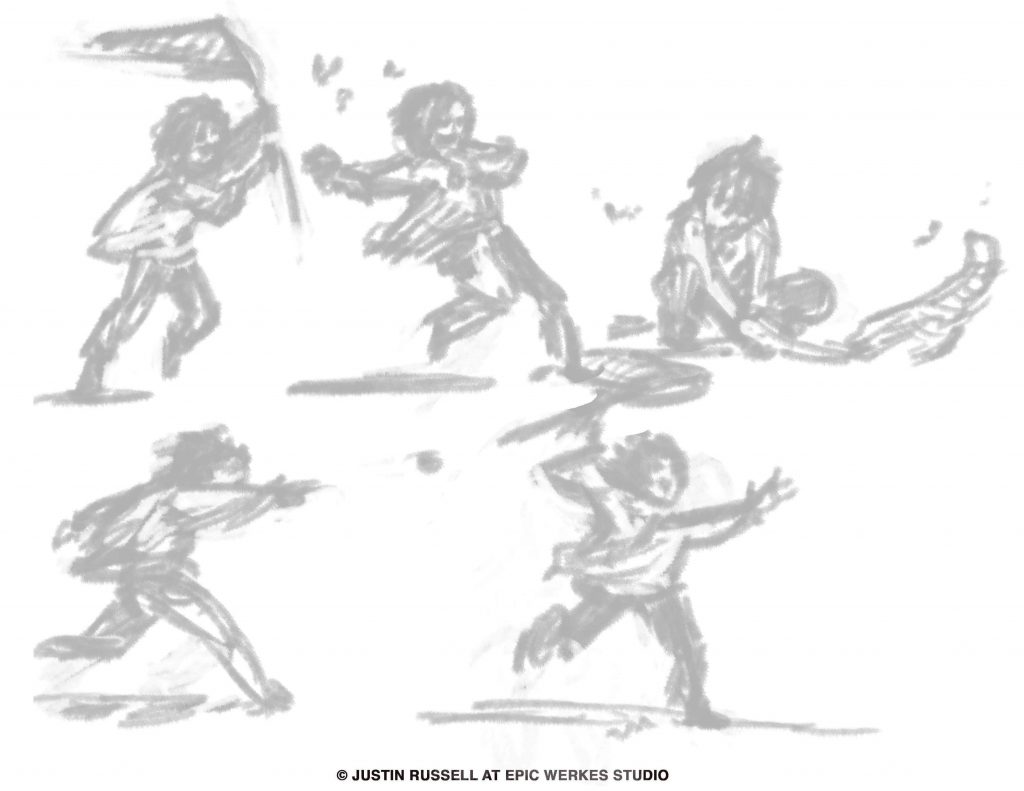
Page 6:
[Illustration suggestions: Close up of NICKOLAI, beside a babbling brook, holding a makeshift net over his shoulder, in which a wet ball resides. In his other hand he holds a bronze tube-flask; it looks like maybe a scroll-case or a section of pipe. At the top end, ARABIC SCRIPT rings the metal and a cork is firmly stuck.}
Once, when he was throwing a ball at the brook and catching it with a net when it would go past him, he found an old metal bottle with a stopper. There were funny words carved around the top, but Nickolai could not read them. The bottle seemed hollow and empty when he shook it, but Nickolai pulled the cork out just to be sure.
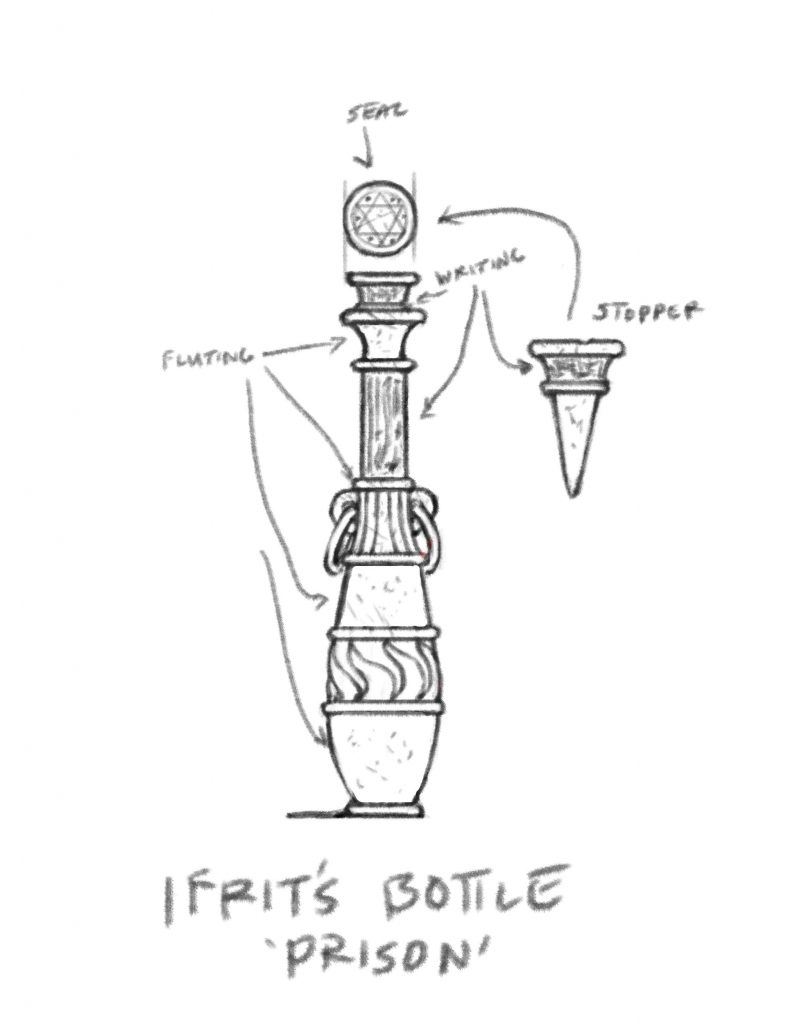
Page 7:
[Illustration suggestions: The cork is in mid-air and a shocked NICKOLAI holds the tube out from himself as an IFRIT has erupted from it with magic fire at the bottom that becomes a huge, bald, squat-faced, almost goblinoid-featured man, with long moustaches and rings in his perhaps pointed ears. He is powerfully built, and a pair of magnificent (and magnificently awful) wings adorn his back}
A great flame jumped from the container, and the flame became a man. He grew tall and stretched his wings, and Nickolai was amazed, because he had never seen flame that turned into a man, or a man with wings before.
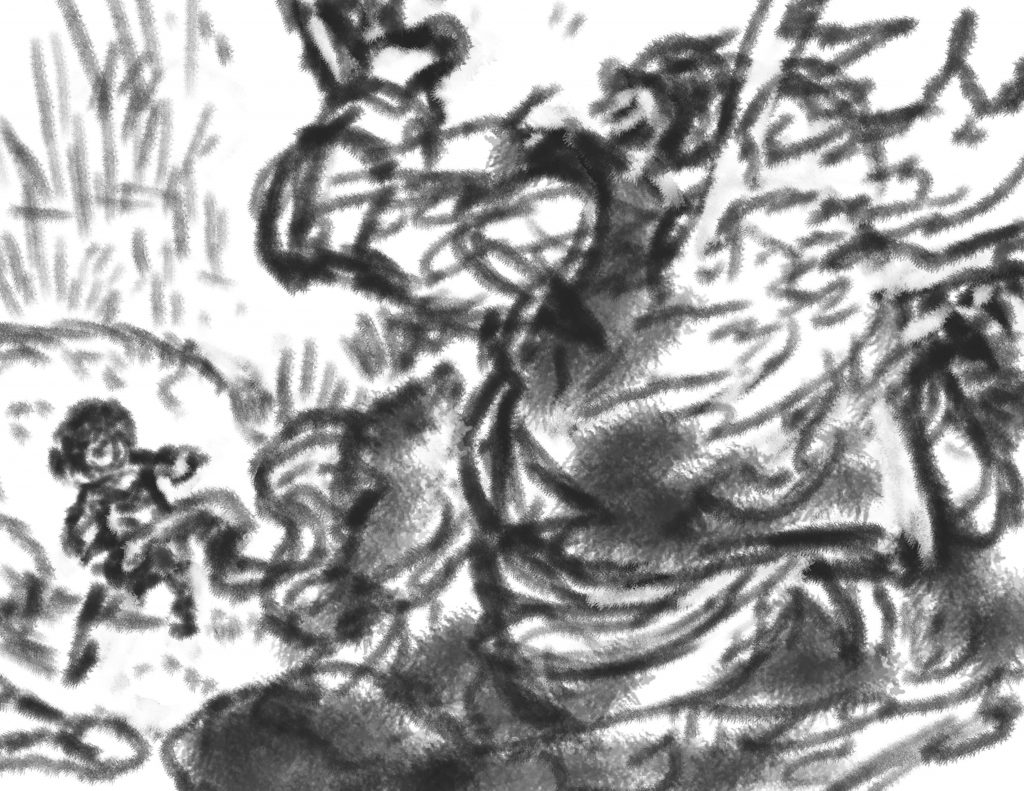
Page 8:
[Illustration suggestions: NICKOLAI can be seen from behind, gesturing in a kind of unsure, but almost courtly greeting. If his face is seen at ¾ angle, he should look not so much scared or terrified, but rather nervous– not nervous because of danger, but because he is unused to company, and wants to make a good impression and showing of himself, despite being surprised. The IFIRIT, for his part, towers over NICKOLAI, and leans down with a cat’s menace at a mouse, or perhaps a man who has noticed an industrious ant carrying a cut leaf and is deciding whether to admire its pluck, or squash it. Bemused, but kinda dangerous. }
“Excuse me, but if it please you, I am Nickolai,” said Nickolai, for his father and mother taught him to always be polite. “And may I ask: who are you?”
The man leaned down to see Nickolai. His eyes still looked like fire and his smile was sharp and toothsome.
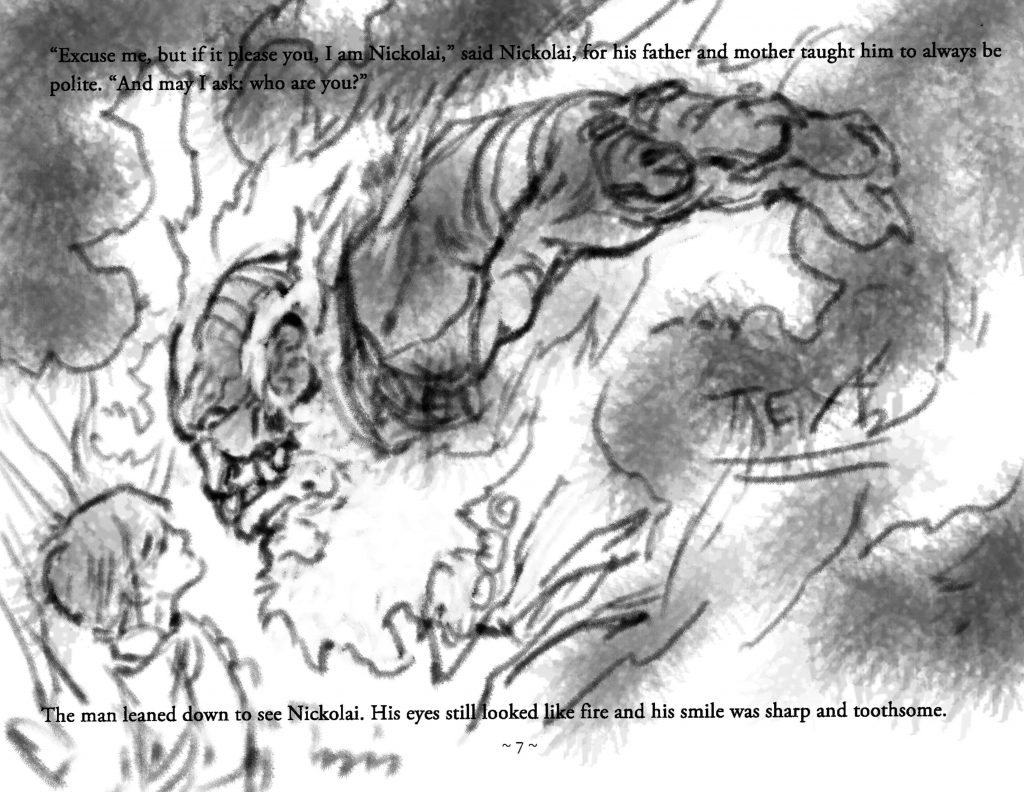
Page 9:
[Illustration suggestions: The IFRIT in full braggadocio; resplendent and arch, gestures in a way that would do John Romita proud, were he to a correct “DO DRAW THIS!” pose for Dr. Doom laying out a villainous plan. Nickolai is maybe in the foreground, in wonder. My inspiration here is the composition of the 7 OF CUPS card in the standard Rider-Waite Tarot Deck; a magical wonder on ethereal clouds that shocks and awes. A suggestion of fire and power behind the IFRIT as he boasts.}
“Know this, boy. I am an Ifrit; I am Flame and Power beyond Time and Out of Mind. My skin is proof against any sword forged by man, and I command strength and magic and dreadful knowledge more than all the words your wisest scholars have ever known to speak or write. When the tallest and mightiest tree in the forest was but a nut on its mother’s branch, even then was I old and full of wrath!”
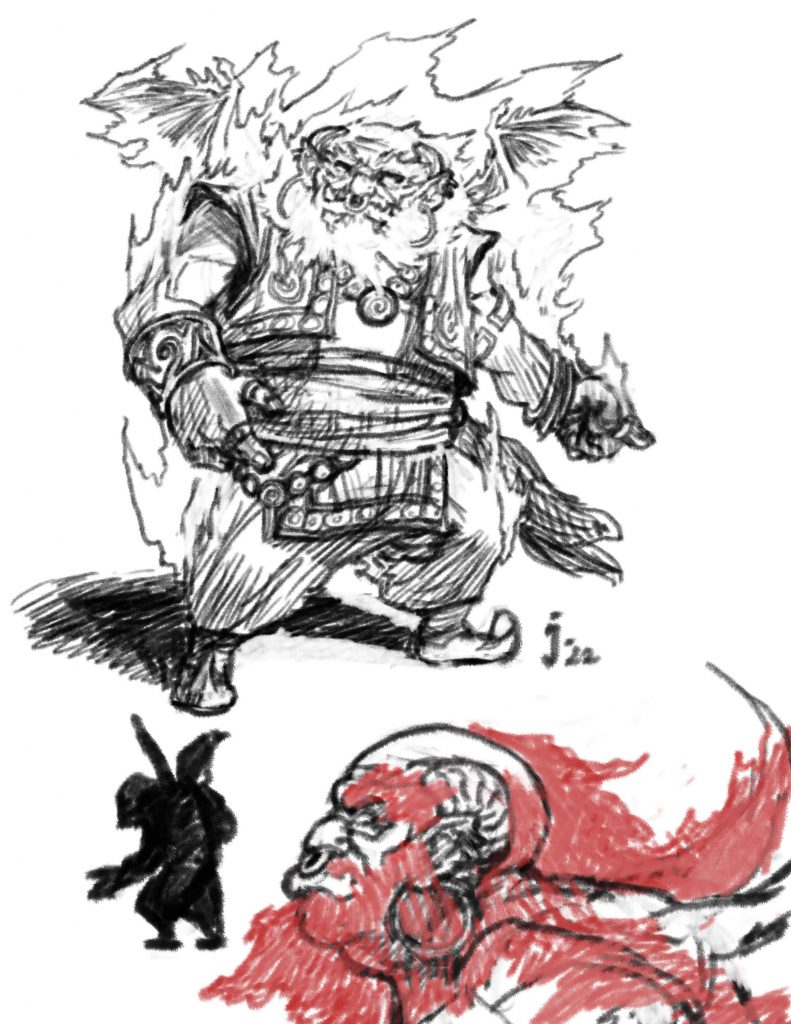
Page 10:
[Illustration suggestions: NICKOLAI, with a shrug and a pie-struck look; the way one might look if one were to blow out a shallow breath to extinguish a candle, but find that one is short of breath. Or maybe the way a kid might look if he pushed an errant brick out of a wall and then saw the entire wall collapse in a pile of rubble. A cross between “Holy shit” and “I did not expect that” but also “whoa.” }
“Oh,” said Nickolai.
Page 11:
[Illustration suggestions: The IFRIT stands, arms open before NICKOLAI; he is at once conspiring and threatening. He is very close to the boy, leaning forward into NICKOLAI’S personal space and arching with wings. It is a proposition and an accusal. NICKOLAI is standing with his hands down, and perhaps his head and neck leaning back, to give room and recoil, but not stepping back to be rude.}
“By Names and spells I was made a slave and imprisoned in the flask, by a long ago king who was wise in the ways of magic. He grew rich and powerful from my labors. Now, I am free to return to the terrible City of Brass which is made of metal and its streets of fire. You have freed me. You have broken my bonds when you opened my flask, so by the laws I must follow, I must grant you one boon, one WISH, before I quit this place and fly home.”
The Ifrit leaned in close to Nickolai and it was like standing next to the iron stove in Winter when his father had many logs burning hot inside it.
“Name for me your heart’s desire, boy, and by my powers, I shall give it to you,” said the Ifrit.
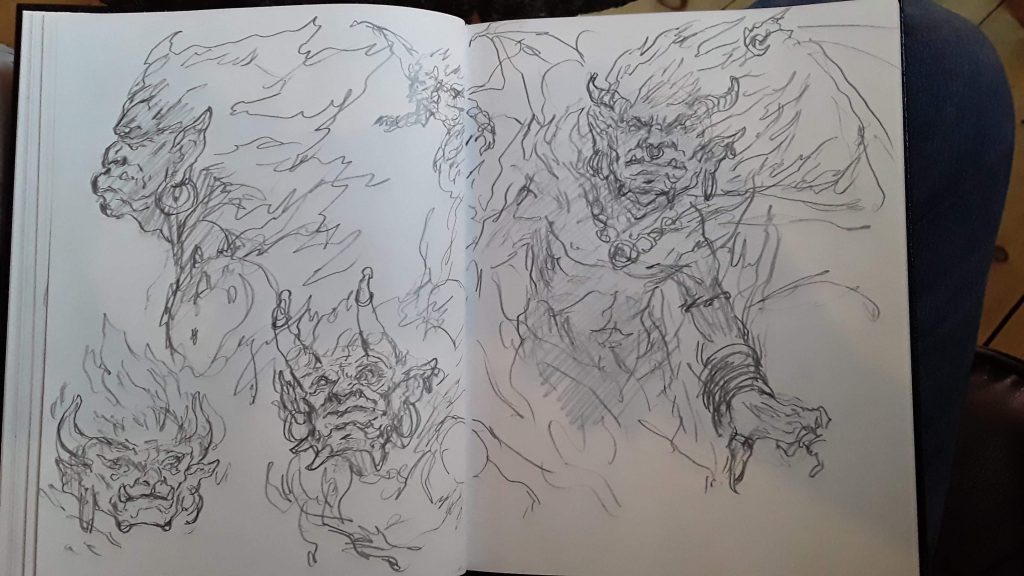
Page 12:
[Illustration suggestions: NICKOLAI is not scared or intimidated by the IFRIT, but is rather put on the spot by the circumstance and the prompt to make a request. This emotion should be held in mind when deciding on how to draw him. The IFRIT is now in professorial mode; still regal and commanding, but now no longer a threat. Think Yul Brenner in THE KING AND I. }
“Um,” said Nickolai, and he shrugged his shoulders, because he did not know what to ask for.
“Be quick, Little Nickolai. Here, I will help you. Walk with me, and I will show you wonders. Do you wish for…
Page 13:
[Illustration suggestions: As the IFRIT spins his suggestions, they can take form, perhaps, as misty images seen through a cloud he gestures at? Or integrated around and behind him? The idea is that as he speaks, NICKOLAI “sees” the possibility, but we are well aware that they are still in the forest, They may be walking now, in discussion, to change up the backgrounds, which maybe gradate from Forest to images summoned by the IFRIT’s words? Somewhere in that, by whatever visual scheme, a mine that shows overseers with whips and shackled workers, broken and supplicating, holding out raw jewels for approval is present. }
“A deed that will make you the owner to a far off mine of diamonds? Each day, jewels are taken from the bones of the Earth by chained prisoners, all yours to command! I can give this to you. Say the word, and I shall fetch it. You will be wealthy for the rest of your days, and Lord and Master over them all.”
Nickolai shook his head for “no,” because that sounded dreadful.
Page 14:
[Illustration suggestions: This suggestion shows YOUNG NICKOLAI the idea and image of GROWN NICKOLAI, at 19, in wicked armor and confident, but also ruthless. He holds an oversized rune-sword of obvious great power. Even though GROWN NICKOLAI in the vision is thin (but cool looking) he wields the blade easily and with a kind of scary arrogance, Castles and dragons and images suggesting battle and woe, glorious but dolorous as well– the great dragon pictured may be wounded or slain; fields of vanquished foes lying motionless on a battle-field, or other such things, giving the tone-feeling of the aftermath of conquest.}
“Power! If you wish it, I know the secret place of the terrible sword named Gram! It is so sharp that it can cut anvils in two. Long did it sit, wounding the Tree of the Worlds, waiting to be drawn out by a doomed hero. Forged by old gods long dead, whoever holds the sword will be able to strike down his enemies by the tens and twenties. With it, you can slay dragons who have known life for a thousand years. Think of the glory, Nickolai. You will be their end, and all will know your name and all will fear you. Speak it, and it shall be yours!”
Page 15:
[Illustration suggestions: Back to NICKOLAI in the forest; if the IFRIT is seen at all, maybe it is over his shoulder. This illustration should be back to reality, so that the idea that the previous ones were spun-dream images is reinforced. NICKOLAI should look guileless and honest.}
“No, thank you, though,” said Nickolai, for he was a polite boy. Nickolai did not wish to cut down men by the tens or twenties, or kill dragons who had never bothered him.
Page 16:
[Illustration suggestions: The IFRIT is now insistent, spinning another image and suggestion. He smiles like a fox, for he is sure he has come up with the suggestion that will be taken, one for which no one can resist. The images summoned are of swooning girls; think the screaming crowds that met the Beatles. Maybe a shadow image of OLDER NICKOLAI from behind, so that we can see the back of the HELMET, but not his face– light rays, as like a drawing of the sun, could be emanating out, so we see the frantic and love-mad faces of the crowds of admirers?}
“Listen. For there is a magic helmet I know of. Whoever wears it will seem to be the most handsome and beautiful of all. All will fall helplessly in love with you. They will abandon all else to do what pleases you. Mothers would leave their children to serve you! Brides on their wedding night would leave their true loves, all to love only you! And you need not love them back, but that it pleases you. And when you are done with them, you may throw them away and have more! Tell me, Nickolai, will you wear this helmet? For I can fetch it and have it on your head before you can blink.”
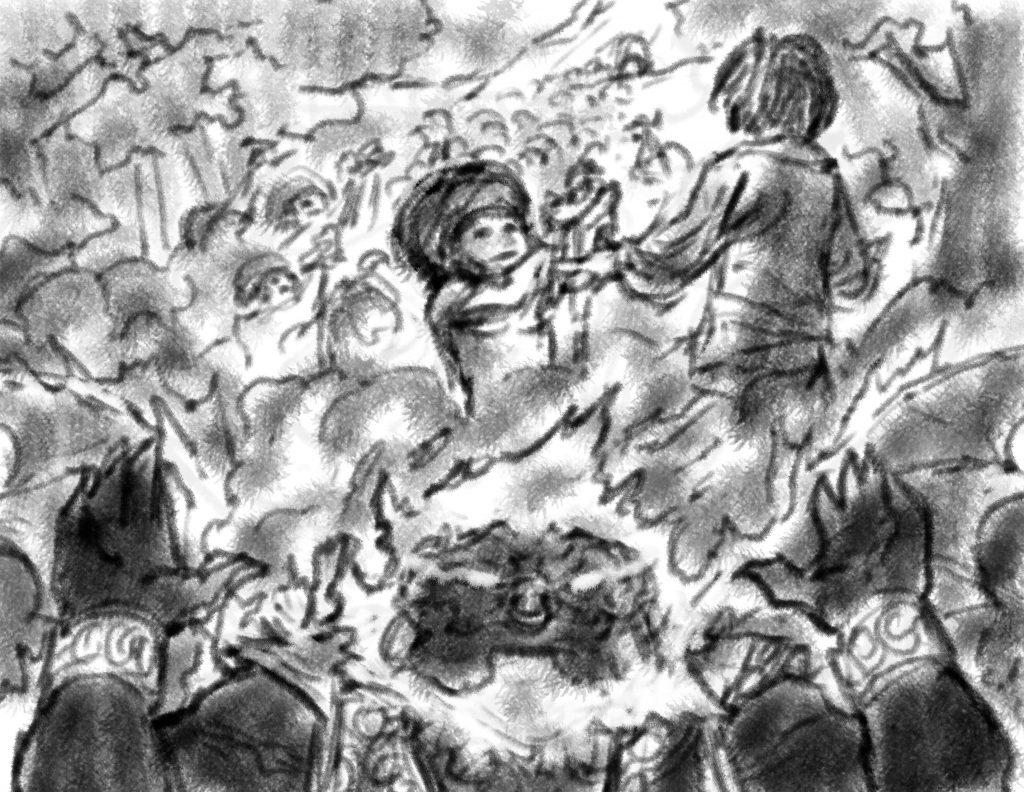
Page 17:
[Illustration suggestions: Back to NICKOLAI and THE IFRIT, this time a two-shot, from more of a distance. NICKOLAI is looking down, having just kicked a pebble into the brook. The IFRIT is is shrugging in maybe Shatner-esque shrug, like, “What do you WANT?” with open palms? Or some kind of “this does not compute” gesture. He should not look menacing or scary here, even if he objectively IS by his design. The posture should disarm him at this point.}
Nickolai kicked a pebble into the brook. “No, I do not think that would be nice to do,” he explained.
The Ifrit was confused. “You do not want any of these magnificent, terrible gifts? Oh, I am sad, Nickolai, for I am bound to grant you what you wish for, before I can go. You have freed me from my prison in the flask. But my duty to the Great Laws keeps me here, waiting to know what you wish. Speak, boy. Tell me what you wish from me.”
Page 18:
[Illustration suggestions: NICKOLAI, extending the BALL that has resided in homemade net up to now, to the IFRIT. Mabye a POV shot, emphasizing NICKOLAI’s smallness, and the act of reaching out, unsure but hopeful?}
Nickolai looked around and noticed it was getting to dusk, the sun was soon to set, and his supper would be hot and waiting for him.
“I, too, have to be home soon. But before I go… do you want to play catch with me?”
“Is it your wish that I play catch with you?”
“Well,” said Nickolai. “Only if you want to.”
Page 19:
[Illustration suggestions: No words. The IFRIT, caught in a look of wonder, bemusement, but maybe a viewer could confuse it with outrage or anger– at least menace; he should look scary but with a glint of dawning understanding in his eyes. A child looking at the illustration should have a moment of uncertainty as to whether the Ifrit will laugh, or eat Nickolai in the next moment. That’s the expression that needs to be caught.]
Pages 20 and 21:
[Illustration suggestions: No words. a single splash page illustration across the open book of a silhouetted hillside, near sundown, with a BOY on one side, and a WINGED MONSTER on the other, capturing a gesture of play, as the circle of the ball is drawn in motion between them, with NICKOLAI throwing. This is the whole thing– this illustration IS THE BOOK, it has to be perfect– it has to evoke wonder and magic and boyhood and fun, but be bittersweet as well; an impossible moment that is magically made real, but cannot last– ET flying Elliot across the moon kind of thing– the colors of the sunset should be beautiful, but also suggest that it is soon to be changed to a different phase; this is a rosebud to be gathered while one may and all that.]
Page 22:
[Illustration suggestions: NICKOLAI, walking on a path. In the distance of the sky, the small shape of a winged creature can be seen heading toward the side of the page, and away. THE COTTAGE can be seen in the distance, at the end of the path, with cooking smoke rising from the chimney.]
The Ifrit was never seen by mortal men again. Nickolai walked home alone.
He found his supper hot and waiting for him.
Page 23:
[Illustration suggestions: NICKOLAI’s darkened BEDROOM. He is safe and warm in bed, under the covers, and his FATHER stands at the partially open door, light spilling from the area into the room. The FATHER should be wise and good looking; adult but not old, and NICKOLAI’s room should have small details to suggest a happy place. Toys in a casual state of being abandoned mid-play, soon to be resumed- army figures stationed behind a small pile of books as a fort, a teddy bear on the ground, knocked over at an angle, an easel with a half complete drawing of a tiger, maybe? Again, nothing to firmly set a time of modernity– no video games or TVs, but nothing that says this room HAS to be in the fairy-tale past, either. .]
That night, his father asked him, “Nickolai, do you want me to tell you a story for bedtime?”
But Nickolai, who had already had a story that day, said, “No thank you,” for he was a polite little boy. “I am tired from playing.”
“Very well,” his father said, and as he shut the door he told him, “I love you so very much. I wish you sweet dreams, Nickolai.”
And later that night, his father’s wish was granted, too.
Page 24:
[Illustration suggestions:The peaceful cottage at night. The moon hangs happily in the sky, which is a comforting dark-blue blanket spotted with a multitude of stars. Maybe an owl in a nearby tree, and in another spot, far away, a tentative mouse, can be seen ]
Once there was a boy named Nickolai, and he was happy because he was loved.
He lived in a cottage in the woods, and while his family was not wealthy, he did not want for much.
Page 25:
[Illustration suggestions:No illustration. A blank white page with a single sentence.]
But a game of catch with a friend every now and again would be nice.
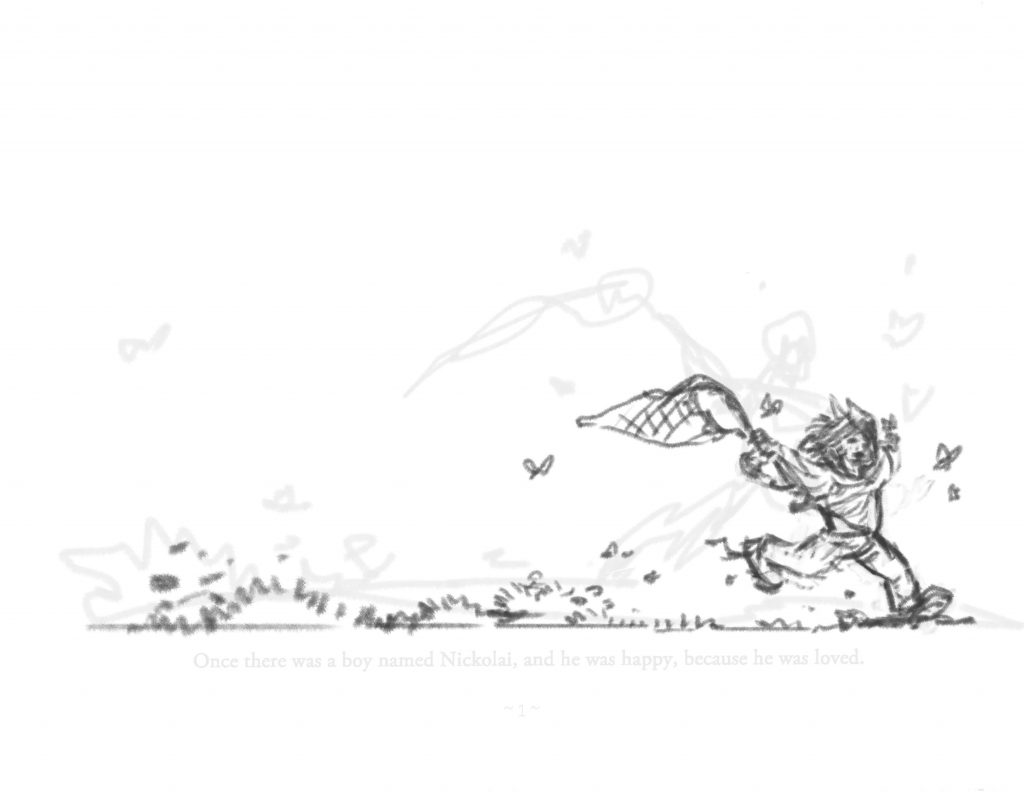
The End.